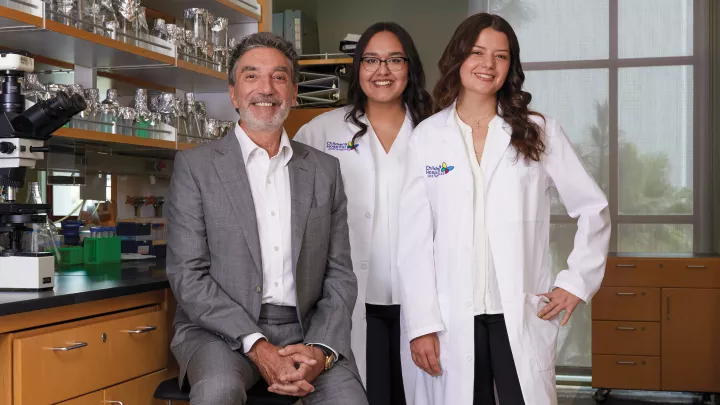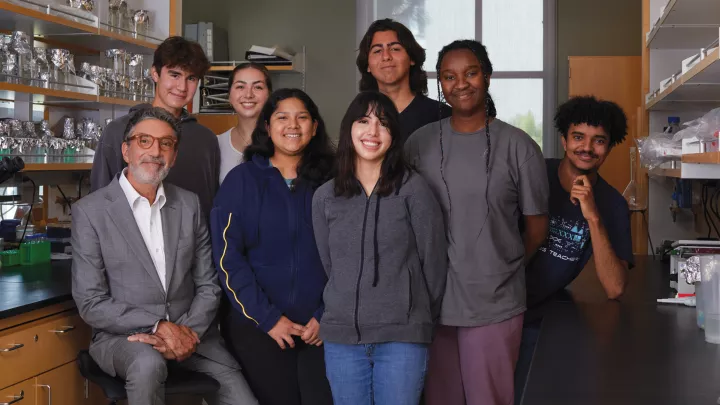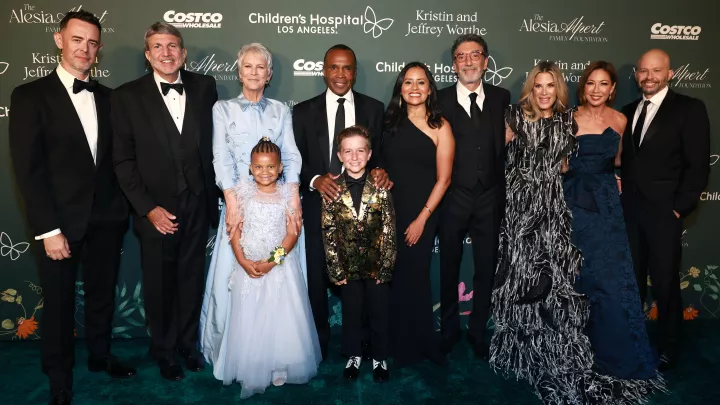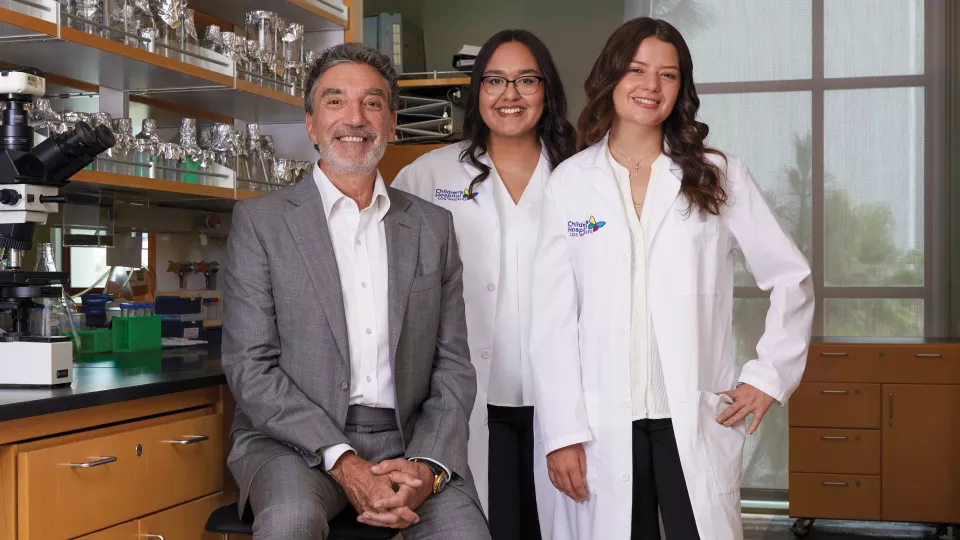
Chuck Lorre with Heidy Paniagua, center, and Andrea Lanz, participants in the Chuck Lorre Research Scholars Program
Chuck Lorre: Making the Grade
Chuck Lorre can't stop smiling as he strolls down a sunlit hallway in The Saban Research Institute of Children's Hospital Los Angeles. The veteran TV producer listens intently to Andrea Lanz, 19, a summer research intern from University of California, Irvine, as she describes a study she's working on involving cellular pathways of lung adenocarcinoma.
Revered for writing, creating and producing some of television's most beloved programs of the last several decades—including "Two and a Half Men," "Mom" and "The Kominsky Method"—Lorre was taken aback years ago when he read news reports that there was an uptick in young people pursuing science, technology, engineering and math (STEM) education because of "The Big Bang Theory."
The art-imitates-life scenario is astounding to Lorre, co-creator of "The Big Bang Theory," the longest running multi-camera television comedy ever, which revolves around the lives of four young scientists.
"I can't help thinking I'm having this conversation with this young person about their research because 20 years ago producer Bill Prady and I decided to make a show about smart people," Lorre says. "In our wildest dreams I don't think we anticipated we would be at a moment like this where it's impacting young people's lives."
Lorre is indeed having a major impact on the lives of young people. In addition to influencing a generation of people to study STEM, he is making significant investments in programs that support research education and mentorship for students from underrepresented backgrounds.
"The goal of 'The Big Bang Theory' was to make people laugh. When I saw that remarkable reporting that the show had that kind of effect on young viewers, I said, 'Oh, this is much more than a sitcom. We can actually participate in helping kids pursue STEM education,"' Lorre says. "I've been really fortunate in my career and it's a great opportunity for me to share that good fortune."
A better tomorrow
Thanks to a generous $10 million gift from The Chuck Lorre Family Foundation, Children's Hospital Los Angeles has established the Chuck Lorre Research Scholars Program, which welcomed its inaugural class in the summer of 2023.
The first of its kind at CHLA, the program supports college students from underrepresented backgrounds in pursuing research training and education. During a 10-week paid summer internship, the students—including alumni of the Samuels Family Latino and African American High School Internship Program (LA-HIP) at CHLA—have opportunities to participate in real-world investigations in accredited laboratories, co-author scientific papers, network with other researchers at events and speaker seminars, receive mentorship from scientists and get career guidance from Emil Bogenmann, PhD, EdD, Director of the Chuck Lorre Research Scholars Program.
"At Children's Hospital Los Angeles, fulfilling our mission to create hope and build healthier futures includes educating those who will be the future of health care," says Paul S. Viviano, President and Chief Executive Officer at CHLA. "This generous support from The Chuck Lorre Family Foundation not only helps us fulfill our mission, but it also fortifies our efforts to ensure equitable health care for all."
The Chuck Lorre Research Scholars Program broadens Lorre's commitment to STEM education by supporting college students who identify as an underrepresented minority in their quest to become scientists or clinician-researchers. His recent gift also extends support for the Samuels Family LA-HIP, a high school level internship program at CHLA started by Dr. Bogenmann in 2005, which is aimed at increasing educational opportunities for juniors and seniors from inner-city schools around Los Angeles.
A few years ago, as the Samuels Family LA-HIP turned 10 years old, Dr. Bogenmann was curious: Where were the students and what did they end up becoming? He learned that while many students ended up at prestigious universities, many had chosen other fields of study. Some had been discouraged by the rigorous coursework; others didn't have time to get back into the lab. He realized there was a need for additional support for young scientists.
"In college, students can run into various challenges—a lack of financial support, guidance and opportunities to perform research in a laboratory—which leads to them dropping out of the science pipeline," says Dr. Bogenmann. "Through the Chuck Lorre Research Scholars Program, we are focusing on bridging that gap, keeping students engaged and setting them up for success if they decide to go to graduate or medical school."
Pat Levitt, PhD, CHLA's Chief Scientific Officer, Senior Vice President and Director, The Saban Research Institute, says that training programs like the ones at CHLA can be game-changing for medical research.
"Cultivating young scientific explorers by providing real-world research experience under the guidance of our nation's top medical researchers is a collaboration we are grateful to be a part of," says Dr. Levitt, the Simms/Mann Chair in Developmental Neurogenetics at CHLA. "The impact that LA-HIP and the Chuck Lorre Research Scholars Program can have on science and medicine is immeasurable."
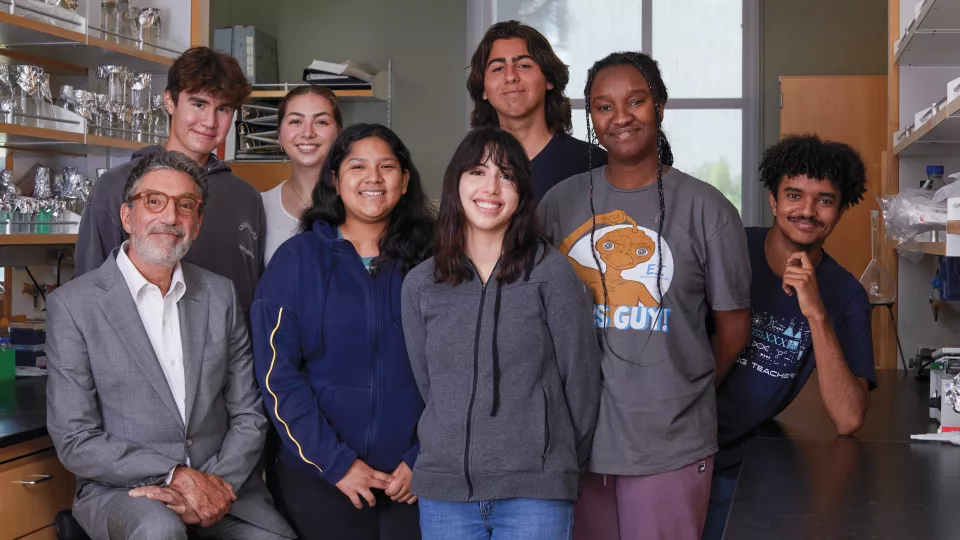
Giving back
As a young man in his 20s, Lorre was diagnosed with ulcerative colitis. Without health insurance and without much money, he didn't know where to turn.
"It was a very frightening time in my life and I was fortunate that I survived the illness," he says.
That experience stuck with him and made him want to help others in the same position. In the 1990s, Lorre had the opportunity to leverage his success in the entertainment industry and give back to the community.
"I realized I was in a position to try and make sure that what happened to me didn't happen to other people," he says. "It started with the Venice Family Clinic. I was given a tour and I thought, 'This is an opportunity to be part of something where you don't need insurance, you don't have to have a nickel, and you can see a doctor.'"
Established in 2013, The Chuck Lorre Family Foundation expanded Lorre's philanthropic efforts. He supported STEM education with The Big Bang Theory Scholarship Endowment and Graduate Fellowship at the University of California, Los Angeles, and The Young Sheldon STEM Initiative for public schools in Southern California.
The Chuck Lorre Family Foundation has been supporting Children's Hospital Los Angeles since 2016. Both Lorre and CHLA are dedicated to facilitating education and training for students from underresourced communities in professional fields of science and medicine.
"We are grateful for the steadfast support The Chuck Lorre Family Foundation has given Children's Hospital Los Angeles," says Alexandra Carter, Senior Vice President and Chief Development Officer at CHLA. "Mr. Lorre's commitment to the advancement of students from underresourced communities is an investment in the scientific leaders of the future."
Lorre deflects the praise, insisting that he is the one who is grateful to step outside of the entertainment world where he has thrived for so many decades—and pay it forward.
"Our mission is to fund innovative and compassionate organizations in the areas of education, health and the arts," says Trisha Cardoso, President and Chief Giving Officer of The Chuck Lorre Family Foundation. "The Chuck Lorre Research Scholars Program and the Samuels Family LA-HIP align with this goal by investing in the futures of bright young professionals. We're proud to be part of this endeavor and look forward to seeing the students flourish in the sciences."
A ripple effect
After speaking with the Chuck Lorre Research Scholars and spending time with several LA-HIP students at Children's Hospital Los Angeles, Lorre seems humbled by the possibilities of what a program like this can accomplish.
"It's an extraordinary feeling to know that we might have altered the trajectory of someone's life in a good way," Lorre says. "It makes me feel grateful that I've been able to do this."
The gratitude goes both ways, says Lanz, the college intern who shared her research with Lorre. "Being able to be part of a lab over the summer is typically not something students as young as me get to do, and it's very uncommon to receive funding for undergrad research," she says. "I am a first-generation American, a daughter of two Venezuelan immigrants. If not for this program, I would have had to do other jobs to make money, like retail or restaurant work—nothing related to biology. But the Chuck Lorre Research Scholars Program allowed me to pursue my interests for the future, and I truly appreciate it."
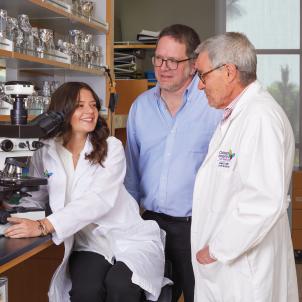
Dr. Bogenmann says the impact goes far beyond the individual students who participate in the program.
"This is not just an investment in another person but in the community," he says. "We need to understand why certain populations, especially minorities, suffer more from certain diseases. If we involve those individuals in the research process, they will bring those questions to the table and help answer them."
Mark Frey, PhD, Director of LA-HIP, sees the long-term ripple effect of supporting young people from traditionally underrepresented communities as crucial to health care.
"There are structural barriers to students from historically minoritized communities pursuing a career in science," explains Dr. Frey. "This is a huge equity issue. Also, if opportunities don't exist for a significant portion of the population, we might be missing out on brilliant scientists who could come up with the next Nobel Prize-winning discovery—and that's a loss to society as a whole."
Lorre's philanthropy is motivated by this long-term impact on society, as well as the direct effect his giving has on the lives of the student researchers, who—thanks to this new program—can follow their passions.
"Science? Health care? Research? Interaction with patients and treatment? It's an enormous field. It seems ripe for opportunity, and hopefully that's what this program does," Lorre says. "That health care will be provided by those very same underrepresented communities—that's the better world you hope for, isn't it? That's the dream that it isn't a stratified society. It's simple for me. If you can create an opportunity for another human being, why wouldn't you?"
Additional reporting by Eunice Wallace
